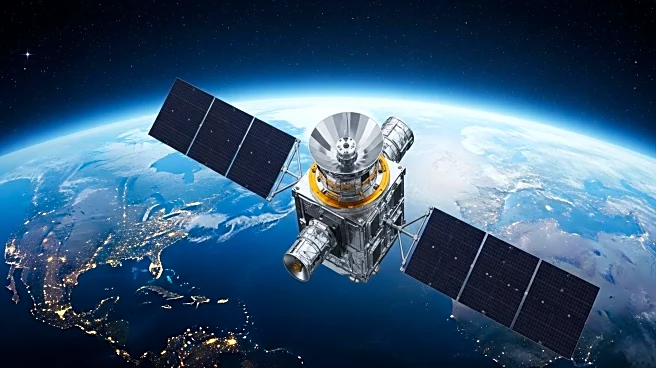What's Happening?
The UK Space Agency has allocated £1.5 million to six innovative projects aimed at utilizing satellite technology and artificial intelligence to address climate change, improve transport networks, and enhance accessible travel. These projects are part of the Unlocking Space for Business program, which seeks to drive innovation in priority sectors, accelerate growth, and establish technological leadership. The funding will support initiatives that reduce carbon emissions, facilitate the transition to net zero, and boost accessibility, thereby creating new growth opportunities for the UK's space sector, which employs 56,000 people. Notable projects include Ether Capital's real-time carbon risk dashboard for the shipping industry, Furrer+Frey's satellite-powered railway electrification tool, and MakeSense Technology's navigation platform for visually impaired individuals.
Why It's Important?
These projects represent a significant step in leveraging space technology to tackle pressing environmental and societal challenges. By integrating satellite data with AI, the initiatives aim to provide scalable solutions that can be deployed nationally and internationally. This approach not only supports the UK's Industrial Strategy but also positions the country as a leader in space-enabled climate solutions. The projects have the potential to transform industries by offering greener shipping options, efficient rail infrastructure, and improved accessibility for visually impaired individuals. The funding underscores the importance of innovation in sectors that have not traditionally utilized space technology, opening new economic opportunities and contributing to a more sustainable future.
What's Next?
The funded projects are expected to accelerate the deployment of their respective innovations, with potential implications for various stakeholders, including maritime finance institutions, insurers, and transport decision-makers. As these solutions are developed and implemented, they may prompt further investment in space technology and AI applications across different sectors. The success of these projects could lead to increased collaboration between the UK space sector and industries seeking to enhance their environmental and accessibility efforts. Additionally, the outcomes may influence policy decisions related to climate change and transport infrastructure, encouraging further support for technological advancements.
Beyond the Headlines
The integration of satellite technology and AI in these projects highlights the growing importance of interdisciplinary approaches to solving complex global issues. The initiatives not only address immediate challenges but also pave the way for long-term shifts in how industries operate and interact with the environment. Ethical considerations, such as ensuring equitable access to these technologies and safeguarding data privacy, will be crucial as these solutions are scaled. The projects also emphasize the role of innovation in fostering inclusivity, particularly in enhancing mobility for visually impaired individuals, which could inspire similar efforts in other areas of accessibility.










